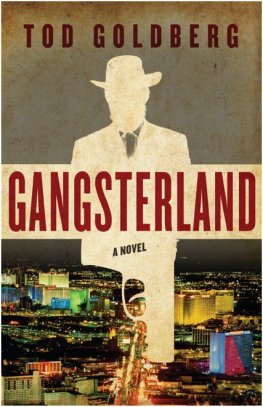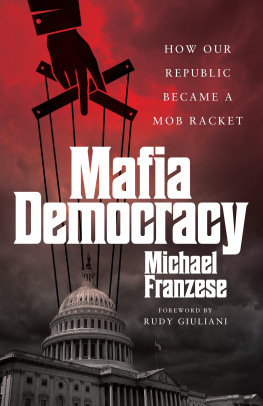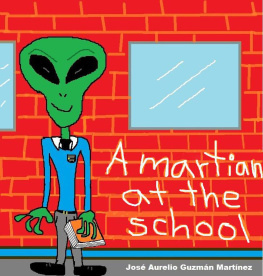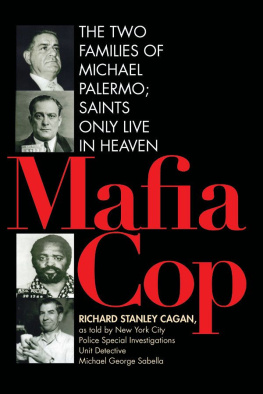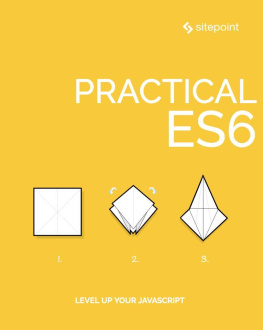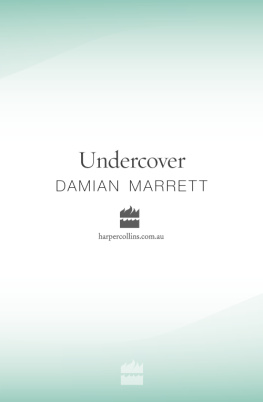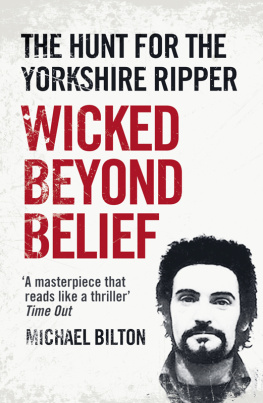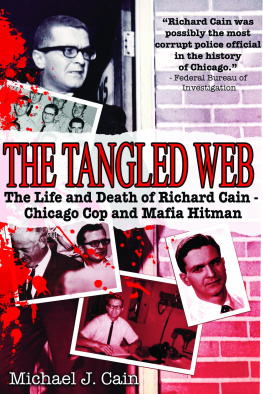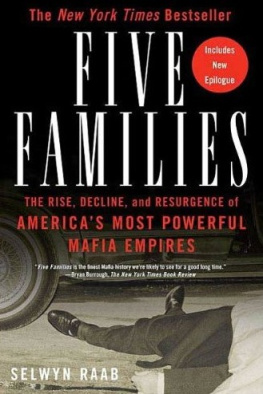ANDTHEN YOU DIE
MichaelDibdin
MichaelDibdin was born in 1947, and attended schools in Scotland and Ireland anduniversities in England and Canada. He lives in Seattle and is married to thewriter Kathrine Beck.
by thesame author
the last sherlockholmes story
a rich full death
ratking
the tryst
vendetta
dirty tricks
cabal
the dying of the light
dead lagoon
dark spectre
cosi fan tutti
a long finish
blood rain
thanksgiving
AndThen You Die
MICHAELDIBDIN
Faberand faber
First published in 2002 by Faber and Faber Limited 3 QueenSquare London wcxn3au
This paperback edition published in 2002
Typeset by Faber and Faber Limited Printed in England byMackays of Chatham pic, Chatham, Kent
All rights reserved
MichaelDibdin, 2002
The right of Michael Dibdin to be identified as author ofthis work has been asserted in accordance with Section 77 of the Copyright,Designs and Patents Act 1988
This book is sold subject to the condition that it shallnot, by way of trade or otherwise, be lent, re-sold, hired out
or otherwise circulated without the publisher's priorconsent in any form of binding or cover other than that in which it ispublished and without a similar condition including
this condition being imposed on the subsequent purchaser
A OP record for this book is available from the BritishLibrary
bbn 0-571-21042-2
2468 10 97531
ToLuca Merlini
Contents
Versilia page 1
Islanda page 45
Roma page 83
Lucca page 123
Versilia
AurelioZen was dead to the world. Under the next umbrella, a few desirable metrescloser to the sea, Massimo Rutelli was just dead.
Thetwo men were different in just about every other respect too. Zen was wearing ashort-sleeved cotton shirt, lightweight wool trousers and leather sandals, andlay back in his deckchair in the shade of the beach umbrella with the brim of aPanama hat lowered over his eyes. Massimo Rutelli was naked except for a minusculeblack swimsuit and an orange towel loosely draped over his upper back, and waslying prone on the green canvas lounger provided for sun-worshippers, hishands resting on die surface of the perfectly smooth sand. But the maindifference between them was that one was dead and the other was dreaming.
Thedream was one that Zen had had recurrently for many months now. He had no clearidea how long exactly. His memories of the period since lincidente were as partial, confused andunreliable as those of his childhood. As for the dream, it always involvedthree fixed elements - a bridge, an imminent disaster, and a happy ending - butthe specific properties, locations and special effects varied from version toversion.
Thebridge, for example, could be as small as a concrete culvert under a motorway,or a massive structure so long that neither end was visible from the middle. Onone occasion it had been a wooden trestle across a fast-flowing river. A steamlocomotive pulling a train was approaching the far side while the ignited fusefizzed down through the undergrowth towards the stacked sticks of dynamite. Butit had been lit too late, and the carriages crossed safely before the trestleswere flung spectacularly up into the air, to fall again like so manymatchsticks.
Anotherinstance had been a rope footbridge suspended across an abyss whose depths wereconcealed by thick, slowly coiling currents of mist. In this case the threathad come in the form of a plague of shiny black beetles nibbling away at theropes with their
razor-sharpmandibles. It was only when the last strand seemed about to give way that itbecame apparent that the guy lines were not made of hemp but steel cable,against which the horde of insects was powerless.
Thistime, though, the ever-resourceful dream director had come up with yet another scenario.Since the 1960s, mere had been talk of building a bridge across the Straits ofMessina to replace the slow and inadequate ferry services which provided theonly link between Sicily and the mainland. At over three kilometres, it wouldbe one of the longest in the world if ever completed, but it was not so muchthe engineering and construction problems which had stymied the project thusfar as the economic and political ones.
Theestimated cost was so vast that it was commonly expressed in dollars - $4.5billion was one suggested figure - since the corresponding amount in lire wasof an order comprehensible only to astrophysicists. During the long decadeswhen the Christian Democrats had ruled the country, no one had had any doubtinto whose hands that money would go, not to mention the inevitable costoverruns and top-ups for unforeseen circumstances which would probably at leastdouble the original estimate. Unfinished motorways, power plants built onhastily drained swamps and steel mills erected hundreds of kilometres from thenearest source of iron ore had been a commonplace at that period, but even themost brazen politicians backed off from the prospect of being seen to handtheir friends and supporters the best part of one per cent of the country'sGNP. And so the bridge had never been built.
But inAurelio Zen's dream it had, and he was in the middle of it, speeding away fromSicily, back to the safety of the mainland. The bridge itself was not thegraceful suspension span which the real-life engineers had designed, but arusty old wrought-iron girder affair originally designed to carry a railwaytrack, now fitted out with a makeshift roadway in the form of wooden planks.The car Zen was riding in was also a period piece, a huge prewar convertiblewith bulgy cartoonish curves driven by a grim-looking uniformed chauffeurwearing aviator goggles. 'This is a dangerous road,' he mutteredmelodramatically. Zen took no notice. He was enjoying the bright sunlight, theinvigorating breeze, the faint cries of the itinerant watermelon vendors onsome distant beach.
Theywere going so fast that when the gaping hole in the planking appeared deadahead they were almost on top of it. There was no time to brake, so the driveraccelerated and the car leapt the gap, landing on the very edge of the furtherside, its rear wheels dangling over the void. Zen and the driver scrambled outjust as the vehicle tilted back and slid off the edge of the planking. It wasonly now that Zen realized that there had been a third person in the car allalong, a young man sitting in the back seat. He was neatly dressed in a suitand tie and seemed perfectly calm. The only odd detail was that his chest andfeet were bare.
ButZen had no time to think about this, for no sooner had the -car disappearedthan other cracks and cavities began to open up in the surface of the bridge.It had been designed to withstand an earthquake stronger than the one that hadlevelled Messina in 1908, but this one must have been stronger still. Whole sectionswent tumbling down into the water far below, until the only one remaining wasthe short length where Zen was perched, and it too was now growling andshuddering beneath his feet. But the cardinal rule of these dreams was that thehero always emerged unscathed, and at this point the director - clearly out ofideas about how to save him this time - brought the episode to an abrupt end.The screen went blank as Aurelio Zen woke up.
Heraised the brim of his hat and looked about him. Everything was as it alwayswas, of course. That was the charm of Versilia, the most essential of the manyelements which drew people back there year after year. There were never anysurprises. Nothing unpredictable ever happened. Thats what Franco's clientswanted. They weren't interested in the new, the exotic, the strange or thedifferent. What they wanted was exactly the same as they'd been getting therefor years, if not decades, and in some cases even generations. That was howlong it could take to get a front row seat at the bagno. They were as sought after astheir equivalent at La Scala, where many of Franco's patrons were regularsduring the winter. Zen's allotted place was about a third of the way back fromthe water's edge, and he had only been able to get that because the rights init belonged to a friend of various parties with a professional interest inkeeping Zen alive and out of sight until they needed him. Without their pull,he wouldn't have been able to get a place right outside the toilets.
Next page
